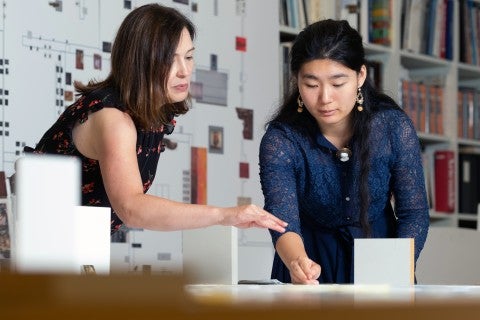To Our Humanities Community
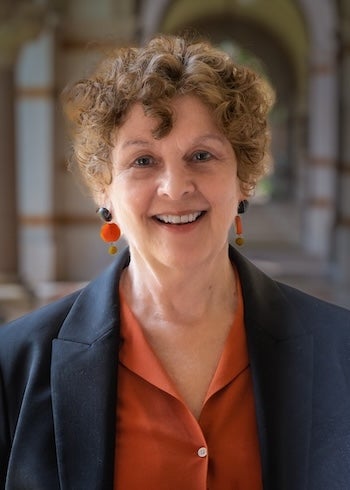
As I begin my seventh year as dean, I am energized and inspired by the changes taking hold at Rice as a result of our strategic pursuit for a more fully integrated and connective humanities. The distinctive qualities of this connective ambition include:
- Meaningful engagement with the sciences, as reflected in the school’s growing research expertise and innovative curricula in Medical Humanities; Environmental Studies; and Science and Technology Studies; and the emergent examination of Ethics of Technology;
- The school’s global expertise in world histories, cultures and languages, including co-curricular study abroad programs and our advancement of African and African American Studies, Latin American and Latinx Studies, and Transnational Asian Studies as fields of research and curricular innovation;
- The growing connections between the visual arts and creative writing and between these creative arts and the text-based humanities;
- The pursuit of humanities research and experiential learning that seeks to connect and reflect Houston’s diversity and standing as a global city; the region’s experience of climate vulnerability and crisis; its landscape of museums, galleries and communities of artists and writers; and the location of the world’s largest medical center at our doorstep.
The innovative and interdisciplinary work highlighted in this edition of our newsletter attests to our pursuit of the connective humanities at Rice.
SAROFIM HALL GROUNDBREAKING CEREMONY FEB. 29
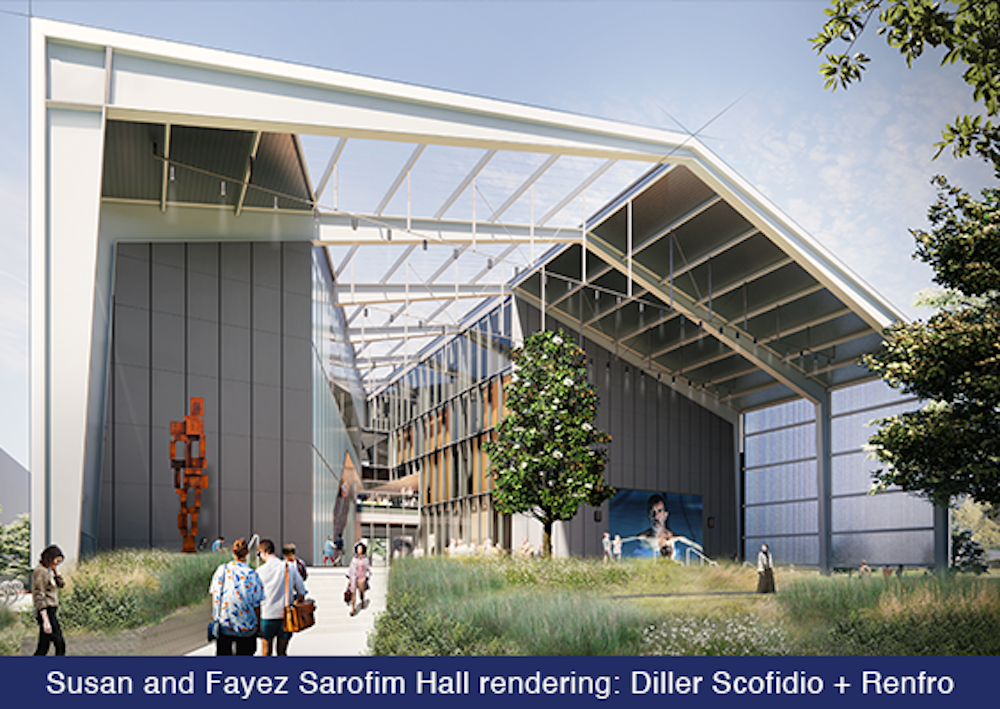
This semester we move one step closer to fulfilling our vision of the visual arts at Rice with the much-awaited groundbreaking for Susan and Fayez Sarofim Hall on Feb. 29. This stunning addition to Rice’s arts corridor is designed by the internationally acclaimed firm Diller Scofidio + Renfro and its team helmed by alumnus Charles Renfro ’87, ’89. Embodying the unique legacy of the arts at Rice, the new home for the Department of Art will highlight the pivotal place of the creative arts in a liberal arts education. We are grateful to all of those who have contributed to making this transformative building possible. To join our groundbreaking ceremony and reception on Feb. 29 at 3 p.m., please RSVP to dpevents@rice.edu or 713-348-4111.
HUMANITIES INNOVATIONS
Humanities Innovations, our event series that spotlights faculty innovations in the School of Humanities while also providing an opportunity for networking among alumni, parents and friends of Rice University, will take place in Washington, D.C., and New York.
On March 7, join us in Washington, D.C., for a discussion of the history and ethics of science and technology — from the dawn of genetic engineering to the most recent developments in AI — with Robert J. Howell, the Yasser El-Sayed Professor and Chair of the Philosophy Department, and Luis A. Campos, the Baker College Chair for the History of Science, Technology and Innovation, and Associate Professor of History.
On April 18, join us in New York for an analysis of the humanities and the history of democracy with Fay A. Yarbrough, the William Gaines Twyman Professor of History and Associate Dean for Humanities, and Associate Professor of History Aysha Pollnitz.
Look for your invitation to join us in Washington, D.C., and New York.
FACULTY DISTINCTIONS AND RECOGNITION
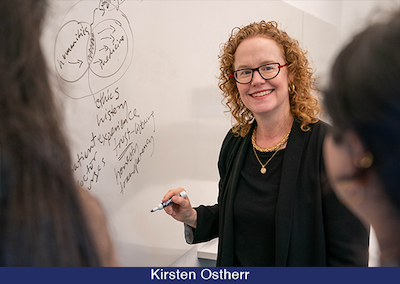
Kirsten Ostherr, the Gladys Louise Fox Professor of English, and director of the Medical Humanities Program and Rice’s Medical Humanities Research Institute, was awarded a National Endowment for the Humanities grant for her book project, The Visual History of Computational Health. A scholar of media, health, medicine and technology, she also received a grant from the Andrew W. Mellon Foundation to support a two-year multidisciplinary Sawyer Seminar, “Reimagining Technologies of Care: Racial Health Equity and Data Justice.” In addition, she is part of a team that has been awarded a National Institute of Health grant to support the development of an innovative clinical immersion program with a medical humanities focus. See Rice News for more.
Esther Fernández, an associate professor of Modern and Classical Literatures and Cultures, received the Vern Williamsen Comedia Book Prize from the Association for Hispanic Classical Theatre for To Embody the Marvelous: The Making of Illusions in Early Modern Spain (2021) and the University of Wisconsin-Madison, Institute for Research in the Humanities: Biruté Ciplijauskaité Postdoctoral Fellowship in Peninsular Spanish Literature and Culture, 2023-2024.
Nana Osei-Opare, assistant professor in the Department of History and an affiliated faculty member in the Center for African and African American Studies, is a National Endowment for the Humanities/Ford Foundation Fellow at the Schomburg Center for Research in Black Culture. As a 2023-2024 Scholars-in-Residence Fellow, he is conducting research for his first monograph, Socialist De-Colony: Black and Soviet Entanglements in Ghana’s Decolonization and Cold War Projects.
Thimo Heisenberg, assistant professor of Philosophy, has received a fellowship from the Alexander-von-Humboldt Foundation. He will be conducting research in his field of German philosophy, social and political philosophy, and political economy during his fellowship stay in Germany.
Spring Song, an exhibition of Natasha Bowdoin, associate professor of painting and drawing in the Department of Art and Humanities Associate Dean, is on view at the Arkansas Museum of Fine Arts through Spring 2025. Known for her cut paper, collage-based work, and site-responsive installations, Bowdoin's other recent exhibition, Sun Dog, was on view at Talley Dunn Gallery in Dallas.
Lisa Lapinski, associate professor of sculpture in the Department of Art, has published Lisa Lapinski, Miss Swiss, the most comprehensive monograph to date of the artist, who is celebrated for her complex sculpture in a variety of mediums — including wood, wire, cement and clay — in addition to painting, photography, drawing and found material.
The Places of Modernity in Early Mexican American Literature, 1848–1948, a book by José F. Aranda Jr., the Terrence Doody Professor of English and Professor of English and of Modern and Classical Literatures and Cultures, was selected among the best scholarly titles of 2023 by Choice, a publishing unit of the Association of College and Research Libraries.
Written amid the COVID-19 pandemic, threats to our democracy and national protests for racial justice, Anthony B. Pinn, the Agnes Cullen Arnold Distinguished Professor of Humanities and professor of Religion, published with Brad Braxton a book, A Master Class on Being Human: A Black Christian and a Black Secular Humanist on Religion, Race, and Justice. Pinn also edited To Speak a Defiant Word: Pauli Murray’s Sermons and Speeches on Justice and Transformation, and co-edited with Darrell Jones and Monifa Love a new study entitled Speculations on Black Life: The Collected Writings of William R. Jones. In addition, he has just published Deathlife: Hip Hop and Thanatological Narrations of Blackness, which serves as the theoretical basis for his new undergraduate course, “The Ethics of Hip Hop.”
April DeConick, the Isla Carroll and Percy E. Turner Professor in New Testament and Early Christianity in the Department of Religion, has written Comparing Christianities: An Introduction to the New Testament and the First Christians, which maps the historical rise of Christianity. This textbook explores the struggles to define the faith by presenting Christianity as the result of a lengthy process of religious consolidation that emerged from a landscape of persistent Christian diversity.
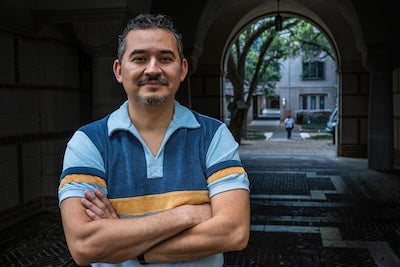
Tomás Morín, associate professor of Creative Writing in the Department of English, has published his latest book, Where Are You From: Letters to My Son. In this collection of letters to his son, Morín shares his experiences with racism to sketch for his son ways to respond to bigotry. He also challenges the reader to reassess our perception of the world and the language we use to understand and label our surroundings.
In her latest book, From Empire to Anthropocene: The Novel in Posthistorical Times, Professor of English Betty Joseph examines how contemporary novels use narrative time to counter cultural homogenization and historical flattening.
Emily Houlik-Ritchey, associate professor in the Department of English and associate director of the Center for the Study of Women, Gender and Sexuality, has authored a book, Imagining Iberia in English and Castilian Medieval Romance, which studies the intersection of religious ethics and intercultural contact in the genre of medieval romance from England and Castile.
Timothy Morton, the Rita Shea Guffey Chair of English and one of the world’s leading environmental thinkers and critics, has written a new book, Hell: In Search of a Christian Ecology, which is set to release on Earth Day, Monday, April 22. From the KTRU Rice Radio studio, Morton also has recorded an audio version of The Stuff of Life, which is part memoir, part philosophical exploration of the meaning of a life, in which Morton asks us to think about the stuff, things, objects and buildings that have formed our realities and shaped who we are and might be.
Bryan Washington, assistant professor of Creative Writing in the Department of English and author of the bestselling novel, Memorial, and the critically acclaimed short story collection Lot, has published a new novel, Family Meal, an intimate story of two young men, once best friends, each struggling with grief and complicated relationships. See the book review in the New York Times for more.
Writer-in-residence (English/Creative Writing) Justin Cronin’s novel The Ferryman debuted on the New York Times and Times (UK) bestseller lists and is a follow-up to his Passage trilogy.
Also from the Department of English, Rosemary Hennessy, the L. H. Favrot Professor of Humanities and Professor of English, published In the Company of Radical Women Writers, which examines the bold voices and lives of writers who as young women confronted capitalist society’s failures and injustices in the 1930s. See The Thresher, Rice’s student newspaper, for more on Hennessy. See Rice Magazine to learn more about these works from Cronin and Hennessy.
Anne C. Klein, Department of Religion professor, illustrates how to liberate our buddha nature to be both human and a buddha as well, in her latest book, Being Human and a Buddha Too: Longchenpa’s Seven Trainings for a Sunlit Sky, through Wisdom Publications. The book is the first volume in the House of Adzom series.
The Cinema of the Soviet Thaw: Space, Materiality, Movement, a book by Art History Associate Professor Lida Oukaderova, which examines conceptions of space in Soviet film of the 1950s and 1960s, has been translated into Russian.
Elias Bongmba, the Harry and Hazel Chavanne Professor in Christian Theology in the Department of Religion, co-edited with Robert Manzinger Philosophy, Freedom, Language and Their Others: Contemporary Legacies of German Idealism. In this collection of essays, they address the complex legacy of philosophical freedom across subjects from contemporary media and political patrimonial culture to literary imagination and the politics of Nelson Mandela.
Matthias Henze, the Isla Carroll and Percy E. Turner Professor of Biblical Studies and director of the Program in Jewish Studies, co-edited with David Lincicum a collection of essays, Israel’s Scriptures in Early Christian Writings: The Use of the Old Testament in the New.
Ragini Tharoor Srinivasan, assistant professor in the Department of English and a Department of Transnational Asian Studies affiliated faculty, co-edited with Pooja Rangan, Akshya Saxena and Pavitra Sundar a book, Thinking with an Accent: Toward a New Object, Method, and Practice.
Daniel Domingues da Silva, associate professor of History and an affiliated faculty in the Center for African and African American Studies, edited “Slavery: Annual Bibliographic Supplement (2022)” in Slavery & Abolition, a journal of slave and post-slave studies.
The Economist published a list of seven books to read about Argentina. Topping the list was The Invention of Argentina by Nicolas Shumway, the Frances Moody Newman Professor Emeritus of Spanish and Portuguese, and former Humanities dean. “This masterly intellectual and cultural history focuses on the 19th-century roots of Argentine nationalism and what Nicolas Shumway … calls its ‘guiding fictions’,” writes the Economist about Shumway’s 1991 work, which The New York Times named a notable book of the year.
NEW APPOINTMENTS
On July 1, 2024, we will welcome:
Faculty:
Amy Berg (PhD, University of California, San Diego 2015), whose scholarly expertise and teaching portfolio include ethics, ethics and technology, social and political philosophy, feminist philosophy, philosophy of law and history of ethics, joins us from Oberlin College as an assistant professor in our Department of Philosophy.
Joining us as of January 1, 2024, are:
Lecturers:
Valentin Duquet (PhD, University of Texas at Austin 2023), a scholar of French and Francophone studies, working in 19th-, 20th-, and 21st-century literatures and cultures, whose research focuses on the fin-de-siècle period (with a particular interest in Émile Zola) and the colonial literature of early-20th-century Algeria through a postcolonial lens, joins us a lecturer teaching French in the Department of Modern and Classical Literatures and Cultures.
Liam Mayes (PhD, Northwestern University 2020), whose research interests include the conceptual and representational history of poverty, social and economic inequality, and the fantasy of meritocracy, joins us as a lecturer in both the Program in Politics, Law and Social Thought and the Program in Poverty, Justice and Human Capabilities.
We welcomed the following earlier this academic year:
Lecturers:
Claire Branigan (PhD, University of Illinois at Urbana-Champaign 2023), whose research interests include femicide, gender-based violence, social movements, human rights, law, Latin America and Argentina, joins us as a lecturer in Spanish in the Department of Modern and Classical Literatures and Cultures.
Erin Cooney (MFA, University of California, Los Angeles 2020), a visual artist and educator whose artwork uses video, installation, performance and community-based practices to investigate issues surrounding ecological crisis and environmental justice, joins us as a lecturer in our Center for Environmental Studies.
Casey A. Williams (PhD, Duke University 2022), whose research examines the political, social, and cultural dimensions of climate change and energy transition, and whose writing on climate, energy and labor has appeared in The New York Times, The Los Angeles Review of Books, Jacobin, Dissent, In These Times, The Bare Life Review, and elsewhere, joins us as a lecturer in our Center for Environmental Studies.
Postdoctoral fellows:
Ablie Jabang (PhD, Michigan State University ’23), whose research explores the effects of environmental control and environmental change on both powerful and marginalized groups of people in Africa, highlighting the myriad ways that people have creatively adapted to and resisted environmental change and injustice, joins us as a postdoctoral fellow in Modern African Environmental History.
Alexandre Pelegrino (PhD, Vanderbilt University 2023), whose scholarship incorporates Afro-Indigenous people’s entanglements in colonial empires to offer new insight into the Atlantic World, joins us as a postdoctoral fellow for SlaveVoyages, the world’s largest database on the history of slave trade, supported by the Humanities Research Center.
As of January 1, 2024, we welcome the following staff member:
Peyton Ball, previously assistant director of communications in the Center for Civic Leadership at Rice, joins the Dean’s Office as a communications and events specialist. In this role, she will collaborate with our communications and events teams to raise our visibility on social media and to engage the Rice community and public through events.
We welcomed the following staff earlier this academic year:
Alyssa Cahoy ’23, who double majored at Rice in English and Health Sciences and minored in Medical Humanities, is the program administrator for the Department of Transnational Asian Studies and Chao Center for Asian Studies.
Melissa Cohen-Nickels is the program administrator for the Joan and Stanford Alexander South Texas Jewish Archives, a collaboration between our Program in Jewish Studies and the Woodson Research Center, where the archive is housed.
Erika Espinoza is the program administrator in the Department of Modern and Classical Literatures and Cultures. She joins us from Houston Methodist Hospital.
Jessica McWhorter became the new program administrator in the Department of History in the mid-fall of 2023. She worked previously at the University of Houston-Downtown and Catholic Charities.
Jenny Judge, whose career in education started as a secondary school teacher, is the program administrator in the Dean’s Office for the following interdisciplinary programs: Environmental Studies; Politics, Law and Social Thought; Science and Technology Studies; and the Theatre program. She joined the School of Humanities from Rice’s School of Architecture.
Liliana Kearson is the program administrator for the Center for African and African American Studies and for the Initiative for the Study of LatinX America. She joins us from the Wiess School of Natural Sciences at Rice, where she served as a development specialist.
Congratulations to the following staff on their new appointments:
Adriana Chiaramonti became the administrator for the departments of Philosophy and Religion in November 2023. She previously served in administrative positions in the Center for Languages and Intercultural Communication and in the Humanities Research Center.
Heather Lazare, an elementary school teacher before joining Rice, has been appointed administrator for the Center for Languages and Intercultural Communication, where she has worked since 2012.
STRATEGIC INITIATIVES AND PRIORITY PROJECTS
Center for African and African American Studies
October 2024 will mark the fifth anniversary of the founding of the Center for African and African American Studies, Rice’s hub for critical conversation, instruction, cutting-edge research and community outreach. With the arrival of Sherwin K. Bryant as center director, as of Jan. 1, 2024, and the $1 million gift from Rice trustee and Humanities Advisory Board member Terrence Gee and family, the center aims to foster an increasingly robust curriculum and high-impact research.
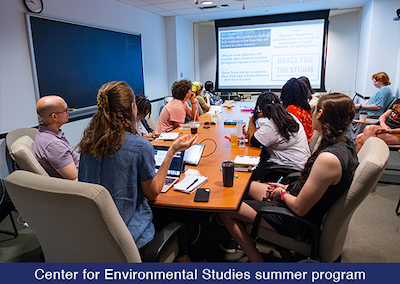
Medical Humanities Research Institute
In the fall, Kirsten Ostherr launched Rice’s Medical Humanities Research Institute, the only institute in the United States and one of the few in the world solely dedicated to advancing translational research on human experiences of health and illness. With collaborators across Rice and the Texas Medical Center, the institute will lead the way in moving human flourishing to the center of how we think about and practice health and care. See Rice News for more.
Center for Environmental Studies
Last summer, the Center for Environmental Studies launched a week-long, on-campus summer program for Houston high school students. In partnership with the Houston Climate Justice Museum, the center brought the students together with community leaders, journalists and scientists to learn about environmental justice and activism through the arts and environmental storytelling. Check out this short video on the School of Humanities YouTube channel to learn about the program and hear the students describe their experiences.
Humanities Research Center
Our Humanities Research Center (HRC) has been engaged in a process of renewal and rebuilding. We are thrilled that Graham Bader, who has been part of this process as a member of the HRC Faculty Council, assumes the position of center director as of Jan. 1, 2024. A professor of Art History, Bader’s research and teaching focuses on postwar European and American art and the avant-gardes of early 20th-century Europe, particularly Germany. His book Poisoned Abstraction: Kurt Schwitters Between Revolution and Exile (2021) rethinks the work of one of Dada’s most idiosyncratic figures. Bader is also the author of Hall of Mirrors: Roy Lichtenstein and the Face of Painting in the 1960s (2010) and the editor of October Files: Roy Lichtenstein.
We are also excited that Gabriela Garcia (PhD, Northwestern University 2021) joined us as associate director of the HRC, as of Sept. 1, 2023. She worked previously at Tulane University, where she led research, programmatic and operational projects for the Tulane Global Humanities Research Center. Her current book project, The Dialectic of Comodismo: Brazil in the Mid-Twentieth-Century Western Cultural Imaginary, examines the relationship between the human and the natural environment in Brazil by theorizing the figure of the acomodado, a Brazilian social type usually characterized as lethargic, complacent and accommodating.
UNDERGRADUATE RANKINGS
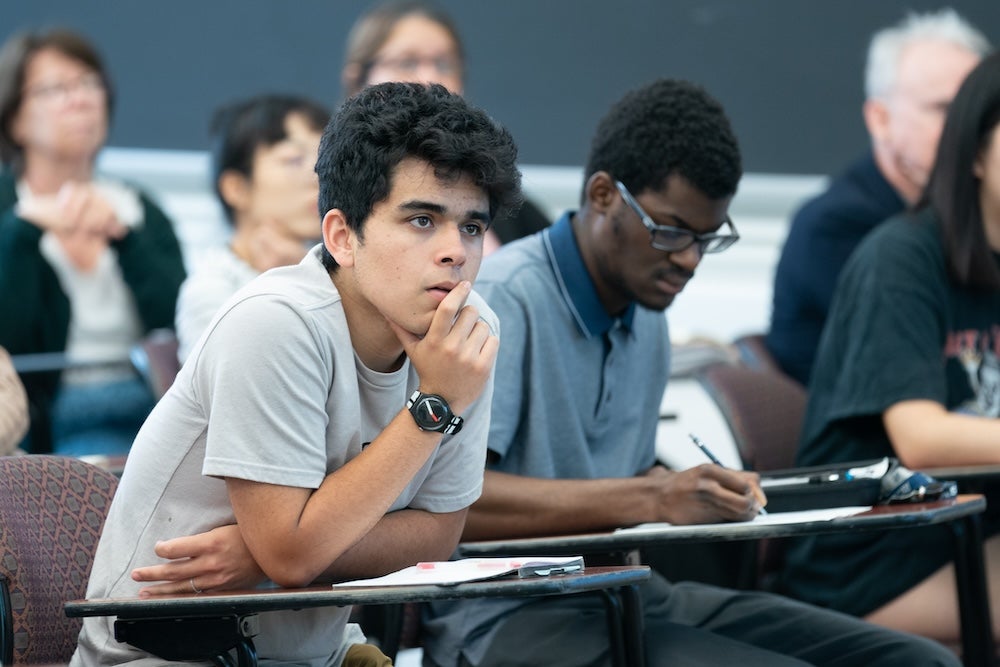
Niche, which relies on U.S. Department of Education data and analysis of more than 1,000 universities — and is considered the market leader in connecting colleges and schools with students and families — has ranked five of our areas of study among the best in the country in its “2024 Best Colleges in America” report. These rankings are a tribute to our innovative and dedicated faculty.
Art #2
Religion #4
Philosophy #9
English #11
History #12
NEW THEATRE MINOR
We are thrilled that the Theatre Program, which is under the direction of Christina Keefe, professor in the practice and director of the program, is now an interdisciplinary minor in the School of Humanities. Visit our new Theatre website to learn more.
STUDENT RESEARCH AND CREATIVE WORK
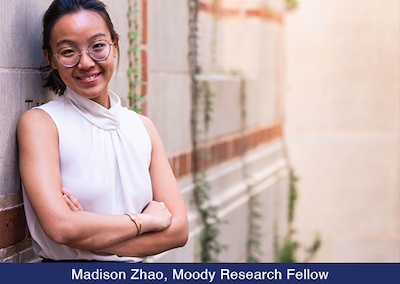
From courses across the humanities and the arts, to our spring break and summer cultural immersion experiences, to the opportunities we provide throughout the year for hands-on research, our students have opportunities to analyze evidence, to interrogate presumptions and to craft compelling arguments. We include here some examples of our students’ research endeavors and creative works:
Madison Zhao, one of our Elizabeth Lee Moody Undergraduate Research Fellows, takes a multi-pronged approach to her studies: through her major in neuroscience, she aims to understand the physiology of psychological diseases and through her visual arts major, she explores humanistic means of expression, while her minor in medical humanities allows her to develop projects to marry the two. Learn more about Madison and the research interests of our more than 30 other Moody Research Fellows.
Camille Villar ’23, majored in both English and in Biochemistry and Cell Biology at Rice. Through our Department of English’s senior seminar — an immersive, year-long, research and writing methods course — she bridged literary and clinical analysis. Today, she is a medical student at Baylor College of Medicine, pursuing opportunities in medical education and medical humanities with the goal of becoming a clinician-educator. See her senior seminar presentation on the School of Humanities YouTube channel.
Through Art History’s HART in the World summer course in Rome, a cohort of 10 students toured cultural and archaeological sites in Rome and neighboring historical cities, including Cerveteri and Siena. Learn about their independent research and study abroad experiences in this video.
Alayne Ziglin, a classical studies major; William Tsai, a triple major in political science, French and German; Chase Brown, a double major in political science and Spanish; Morike Ayodeji, a cognitive sciences major; and Zach Zelman, a triple major in economics, philosophy and French studies, tackled a wide range of topics and ideas as part of their semester-long research projects in Modern and Classical Literatures and Cultures. See Rice News for coverage of the department’s first undergraduate research symposium.
Students in “Understanding Central America,” a course taught by Sophie Esch, associate professor in the Department of Modern and Classical Literatures and Cultures, presented their research at the Third Coast Central America Collaborative, a two-day event hosted by Rice’s Initiative for the Study of Latinx America that brought students together with scholars from the across the Gulf Coast region.
The George R. Brown Forensics Society, our competitive intercollegiate speech and debate team housed in the School of Humanities, brought home 56 awards this fall semester. Congrats, Owls!
ALUMNI SPOTLIGHT
Noorain Fatima Khan ’06, who majored in Religious Studies, Women and Gender Studies, and Political Science at Rice, was elected national board president of the Girl Scouts last July, becoming the first millennial and the first Muslim American to hold the post. Khan, who was honored by our school’s Center for the Study of Women, Gender and Sexuality with its Distinguished Alumna Award, is a Rhodes scholar, a graduate of Yale Law School and a White House veteran, serving on the National Economic Council. Read Rice Magazine to learn about her change-making work at the Ford Foundation, her lifelong involvement with Girl Scouts and what it means to her to serve.
Angela Berry Roberson ’90, who majored in History and Political Science at Rice, was named senior advisor in the Departmental Office of Civil Rights for the U.S. Department of Transportation in October. Berry Roberson, an attorney who has been a civil rights practitioner in the transportation industry for nearly 30 years, served on the Association of Rice Alumni Board (2008–11) and is active with the Association of Rice University Black Alumni, serving as past chair and currently as a member of the ARUBA Advisory Board. See Rice News for more.
LEADERSHIP IN THE SCHOOL
We thank Graham Bader, professor of Art History, for serving as department chair, and wish to extend our warmest gratitude to Leo Costello, associate professor, for returning to serve as chair of the Department of Art History.
We are grateful to Claire Fanger, associate professor in the Department of Religion, for serving as our director of the Program in Medieval and Early Modern Studies, and thank Maya Soifer Irish, associate professor of History, for serving as the program’s previous director.
IN REMEMBRANCE
Robert L. “Bobby” Moody, longtime Rice supporter and a member of the Moody Foundation Board for more than 30 years, died in November. The Moody family and the foundation’s vision will forever be visible at Rice with the Moody Center for the Arts, the Moody Center for Student Life and new endowments in support of student programs, including three in the School of Humanities: the Elizabeth Lee Moody Undergraduate Research Fellowship in the Humanities and the Arts; the Elizabeth Lee Moody International Fund in the Humanities and the Arts; and the future Elizabeth Lee Moody Junior Professorship in Community Engagement and Civic Participation. See Rice News remembrance for more.
Melvin Dow ’48, who served as a member of the advisory board of our Program in Jewish Studies since its inception, passed away in October. Dow, who majored in Philosophy at Rice, graduated from Harvard Law School and served in the military before returning to Houston to practice law. For Melvin and his wife Frieda, their affiliation to Rice and the School of Humanities was a family affair: his father studied at Rice and his son, David, majored in History and served as the Rorschach Visiting Professor in Legal History.
Azizou Atte-oudeyi ’22, a PhD candidate in the Department of Religion who received a master’s in religious studies at Rice, died unexpectedly after a short illness in September. He was deeply interested in Islam and Christianity in the African context, and his research focused on conversion experiences, contemporary African Christianity and Islam, and the impact both religions have had and continue to have on social and economic development in West Africa. See Rice News for more.
Harold Hyman, emeritus William P. Hobby Professor and Chair of the Department of History, passed way in August. An award-winning scholar of American legal history, he taught Civil War and Reconstruction history at Rice from 1968 to 1997. Hyman was author, co-author or editor of more than 60 books, including A More Perfect Union: The Impact of the Civil War and Reconstruction on the Constitution. His academic work on the Civil War and Reconstruction eras also led to his involvement in the Civil Rights Movement — he and other American historians joined the march from Selma to Montgomery led by Dr. Martin Luther King Jr. in 1965. See Rice News for more.
EVENT HIGHLIGHTS

Campbell Lectures with Imani Perry
Imani Perry, Harvard University professor, 2023 MacArthur Fellow and 2022 National Book Award winner, discussed several topics regarding race, law, gender, culture and more during this year’s Campbell Lectures. Perry’s scholarship primarily focuses on the history of Black thought, art and imagination crafted in response to and in resistance against the social, political and legal realities of domination in the West. Her writing is compelling and evocative and invites the kind of engagement we look forward to during our annual Campbell lectures. See Rice News for coverage.
“Justice, Its Bounds and Making a Health Department Antiracist”
In this talk, Melissa S. Creary, assistant professor of health management and policy at the University of Michigan School of Public Health, critiqued the inherent limitations of social justice projects that ignore structural forms of social exclusion and discussed opportunities and challenges for obtaining deeper equity via deep community engagement and anti-racist praxis. See this video of her talk hosted by the Medical Humanities Research Institute and School of Humanities in partnership with the UT Health McGovern Medical School.
“Ethics in the Age of Artificial Intelligence”
In an age where artificial intelligence can write term papers, drive cars and determine medical procedures, what role is there for ethical deliberation and decision making? Is it possible to program ethics into an algorithm? When might it be appropriate to defer to AI when it comes to morally weighty decisions? Robert J. Howell, the Yasser El-Sayed Professor and chair of Philosophy, addressed these issues and more at a packed Humanities NOW conversation. Far from relegating philosophy and the humanities to the sidelines, the age of AI will be a time when we need these disciplines most. Check out this video of his talk.
UPCOMING EVENTS
Martin Luther King Jr. Day Lecture
Tuesday, Jan. 16 | Reception, 3 p.m., Lecture, 4 p.m. | Kraft Hall 130
“Until Justice Rolls Down Like Water: The Enduring Power of Black Freedom Dreams,” a lecture in honor of MLK Day. Speaker: Treva B. Lindsey, professor of Women’s, Gender and Sexuality Studies, Ohio State University
Sponsored by the Center for African and African American Studies
Scientia/De Lange Conference
Friday, Feb. 9 and Saturday, Feb. 10 | Baker Institute
“Brave New Worlds: Who Decides? Research, Risk and Responsibility." Conference chair: Luis A. Campos, Baker College Chair for the History of Science, Technology and Innovation and Associate Professor, Department of History
School of Humanities Kazimi Lecture in Shi’i Studies
Thursday, Feb. 15 | 6:30 p.m. | On campus and online | Anderson-Clarke Center, Hudspeth Auditorium, with live Zoom broadcast
“The Architecture of Coexistence: What Medieval Syrian Shrines Can Tell Us About Modern Sectarianism." Speaker: Stephennie Mulder, associate professor of Islamic art and architecture, University of Texas at Austin
This lecture series is made possible through a generous gift from the children of Syed Safdar and Samina Kazimi.
Politics, Law and Social Thought Presentation and Discussion
Thursday, Feb. 22 | 4 p.m. | Kraft Hall 130
“The Courts v. Democracy? A Dialogue on Judicial Review and Democratic Legitimacy." Speakers: Cristina Lafont, Harold H. and Virginia Anderson Professor of Philosophy, Northwestern University. Gary J. Jacobsohn, H. Malcolm Macdonald Professor Emeritus in Constitutional and Comparative Law, University of Texas at Austin
Sarofim Hall Groundbreaking Ceremony
Thursday, Feb. 29 | 3 p.m.
The groundbreaking of Susan and Fayez Sarofim Hall, our stunning new home for the Department of Art, will be held at the future site of the new building (the former ground of the Rice Media Center) with a reception to follow in the Anderson-Clarke Center, Dean’s Commons.
RSVP by emailing dpevents@rice.edu or calling 713-348-4111.
Women’s History Month Lecture
Tuesday, March 19 | 4 p.m. | Humanities Building 117
“Disability and Reproductive Justice." Speaker: Alison Kafer, director of LGBTQ Studies, Embrey Associate Professor of Women’s and Gender Studies, and associate professor of English, University of Texas at Austin
Sponsored by the Department of History and Center for the Study of Women, Gender and Sexuality, with support from the School of Humanities Dean’s Office

